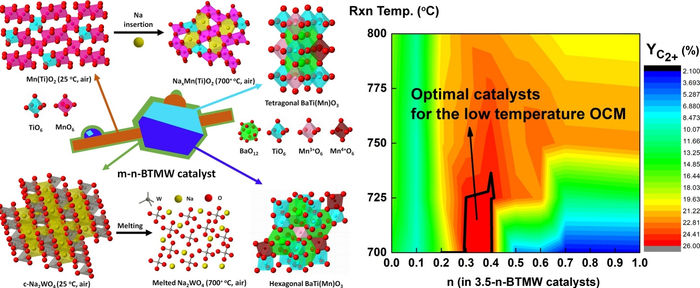Producing ethylene from food waste without greenhouse gas emissions
Technology developed to remove and overcome toxic hydrogen sulfide from the production process. Great help expected for domestic chemical companies to achieve carbon neutrality
The Korea Institute of Science and Technology (KIST, President Dr. Yoon, Seok-Jin) announced that a research team led by Dr. Jeong-Myeong Ha of the Clean Energy Research Center developed a process technology and catalyst for removing hydrogen sulfide, a toxic substance, during the process of ethylene production from methane in biogas.

Graphical abstract
Korea Institute of Science and Technology(KIST)
Biogas, which is produced by microorganisms present in food waste, livestock manure, and sewage sludge, consists mainly of methane that can be used for low-cost energy including power generation, heating, and addition to town gas. Methane can acquire a large added value if converted into ethylene, a basic raw material for industries, through chemical reactions. Ethylene is a typical non-petroleum product that can reduce greenhouse gases.
The research team developed a process technology in 2021 that produces ethylene from biogas with the help of catalysts. In addition to methane, which is fairly useful in general, biogas contains a significant amount of toxic hydrogen sulfide, which is difficult to remove and interferes with the catalytic reaction in ethylene production. The developed technology facilitates ethylene production by oxidizing and removing hydrogen sulfide during the production process.
The researchers then developed a catalyst to improve reaction activity of ethylene production from biogas and methane. This catalyst is highly resistant to hydrogen sulfide, thus not requiring hydrogen sulfide removal from biogas, while the energy consumption can be reduced by lowering the operating temperature from 800oC to 700oC due to improved reaction activity. Through such reaction, it is possible to directly produce ethylene from biogas that contains hydrogen sulfide.
Dr. Jeong-Myeong Ha stated, "Biogas is already produced in large quantities in Korea, and if biogas is used as a raw material for the chemical industry rather than just for heating, biogas producers who struggle to achieve carbon neutrality will have a larger market and be able to provide new raw materials without greenhouse gas emissions." He also mentioned, "This technology will draw attention from related companies as it can utilize not only biogas but also methane generated from various wastes such as plastics."
Most read news
Topics
Organizations
Other news from the department science

Get the food & beverage industry in your inbox
By submitting this form you agree that LUMITOS AG will send you the newsletter(s) selected above by email. Your data will not be passed on to third parties. Your data will be stored and processed in accordance with our data protection regulations. LUMITOS may contact you by email for the purpose of advertising or market and opinion surveys. You can revoke your consent at any time without giving reasons to LUMITOS AG, Ernst-Augustin-Str. 2, 12489 Berlin, Germany or by e-mail at revoke@lumitos.com with effect for the future. In addition, each email contains a link to unsubscribe from the corresponding newsletter.

























































